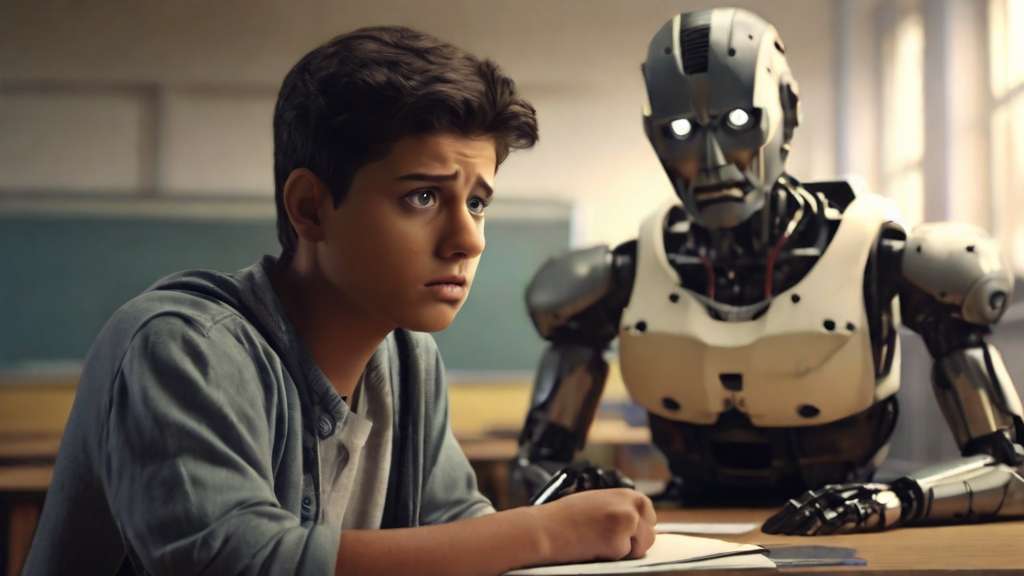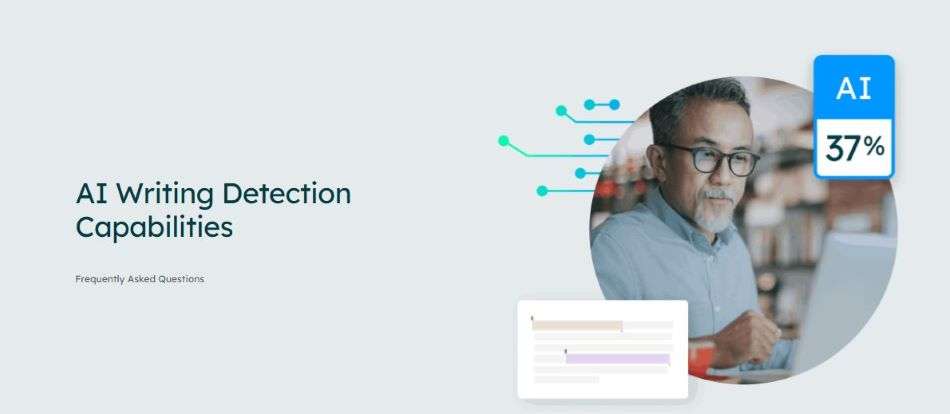Does Turnitin detect Chat GPT? A Student’s Guide to Outsmarting (or Not!)

If you are conflicted between putting in the work or get the fast lane of AI for academic work, you might want to think again. Does Turnitin detect Chat GPT? The short answer is – most likely it does, but there are some strategies to make Chatgpt undetectable.
Let’s face it, university deadlines suck. They loom like shadows under fluorescent lights, tempting even the most dedicated student to consider questionable shortcuts. Before the age of AI, students had only two alternatives: work harder and harder as the deadline approached, or face failing the exams. There were also brain enhancers and nootropics that promised to keep you awake, alert, and hyper-focused on the task at hand: submitting your assignments before it was too late.
Key Takeaways
- Recognize Turnitin’s Strengths: Know that Turnitin can detect Chat GPT and AI-generated essays.
- Maintain Your Integrity: Use AI tools to support your learning, not to undermine your academic integrity.
- Master Editing and Paraphrasing: Enhance AI-generated drafts with your insights to reduce detection risk by anti-plagiarism tools.
- Optimize Your Prompts: Craft detailed prompts to guide AI toward producing more unique, less detectable outputs.
- Understand AI Writing Detection Percentage: Turnitin’s advanced technology provides an AI writing detection percentage, indicating the likelihood that a piece of text was produced by AI tools.
- Weigh the Risks: Balance the convenience of using AI with the ethical and academic implications of doing so.
With the rise of AI assisted writing, the ethical implications of using such technology have become a significant concern. The widespread adoption of AI-assisted writing has made it increasingly important to implement detection tools like Turnitin to ensure content authenticity and maintain integrity.
Introduction to AI Generated Content
Artificially made content has become pretty much the norm in various fields, including academic essays for students. AI writing tools like ChatGPT or Claude can churn out high-quality, human-like text that can be used for essays, research papers, and more. However, this convenience comes with a catch. The use of content generators content raises significant concerns about academic integrity and the potential for plagiarism.
Turnitin is the popular plagiarism detection tool for universities, that has now evolved to detect AI-generated content. This development is crucial in maintaining the standards of academic writing. Turnitin’s AI detection capabilities are designed to identify AI-written text, ensuring that students adhere to ethical writing practices.
A burning question: Does Turnitin detect Chat GPT? It’s crucial to know before you press “submit.”

Getting the essays done on auto pilot sounds tempting, right? But there’s a catch: for AI-written content, there are AI detection tools in place. In academic settings, where plagiarism is highly unethical, one such tool is known as Turnitin, the “academic integrity sheriff.”
What is Plagiarism and why is it unethical?
Plagiarism is the act of taking someone else’s work and passing it off as your own. In academic settings, this is a serious offense that can lead to severe consequences, including failing grades and even expulsion. Plagiarism undermines the value of original work and disrespects the effort and creativity of the original author.
In essence, plagiarism erodes the trust and intellectual environment essential for true academic growth.
AI-generated content has added a new layer to the plagiarism issue. Students might be tempted to submit AI-written text as their own, which is a clear violation of academic codes. Proper citation practices are essential to avoid plagiarism and give credit where it’s due. Turnitin’s AI detection capabilities can help identify AI content in academic papers.
Understanding Turnitin and AI Detection tools
In order to really understand the extent of AI detection and if truly Turniting can turnitin detect chat gpt, we need to understand how it works and what does give-away a text being written by Artificial intelligence.
What is Turnitin and what are its limitations
Turnitin is comparing submitted work against a vast database of academic content, including journals, student papers, and online sources. Turnitin’s AI detection capabilities can identify AI-written text, including content generated by ChatGPT. Learn more about Consensus AI and its potential in enhancing research productivity and accessibility.
However, Turnitin is not infallible. The tool can sometimes produce false positives, flagging content that isn’t actually plagiarized. Additionally, while Turnitin is adept at detecting exact matches and paraphrased content, it may not catch all instances of AI-generated text. Understanding these limitations is important for both students, educators and institutions.
What are the tools against plagiarism?

Picture a digital librarian armed with a magnifying glass and a extensive database of research papers – that’s essentially what anti-plagiarism tools like Turnitin AI detector do in the academic world. Faced with an expanding information and research landscape, where information flows freely and the content is created by both humans and robots, these tools act as guardians of academic integrity.
Turnitin is a state-of-the-art AI tool that uses sophisticated algorithms to scan and analyze your submitted work against a massive database of academic sources, journals, and student papers. With Turnitin’s AI detection capabilities, it can distinguish between human-written and AI-generated content, enhancing its plagiarism detection functionalities. The question is still thrown around: Does Turnitin detect Chat GPT?
The answer is yes, if it is purely AI-generated content. How does it do it? Think of it as a web of interconnected information, where any suspicious similarity flags a potential case of plagiarism. Turnitin doesn’t just point fingers, though. It highlights matching text and provides detailed reports, allowing both instructors and students to understand the flagged areas and address them accordingly.
Remember, these tools are just one piece of the puzzle. Fostering a culture of academic honesty, promoting proper citation practices, and encouraging original thinking remain of utmost importance.
The Role of AI Chatbots in Academic Writing
These tools can generate high-quality content quickly, making them valuable for research and writing tasks. However, the use of AI chatbots also raises concerns about academic integrity. Students might be tempted to submit AI-generated content as their own, which is plagiarism.
While AI chatbots can be useful, use them responsibly. They should be seen as tools to aid the writing process, research, but not as shortcuts to bypass genuine effort. Maintaining academic integrity means using AI tools ethically, ensuring that any facts are properly cited and that the final work reflects the student’s own understanding and effort.
Can Turnitin AI Detector Really Bust Your Essay? (A Student’s Perspective)
So, Chat GPT or other AI writing tool just whipped up a stellar essay for you, saving you from late-night caffeine-fueled mental breakdown. Sounds like a win, right? But hold your horses, because Turnitin AI Detector might get you in trouble by identifying ChatGPT-generated content. Explore a few strategies on how to make AI Content undetectable.
While some students cheer this development, others see it as an invasion of academic freedom. Let’s dissect the situation, shall we?
Turnitin’s got skills to detect ai written content, but not Magic
Yes, Turnitin can detect ChatGPT-generated text to some extent. It’s been trained on mountains of academic papers, including AI-crafted stuff, so it knows the lingo. Think of it as spotting an unfamiliar accent in a room full of native speakers. It can pick up repetitive structures, unusual phrasing, and vocabulary choices that scream “AI, not me!”. Because, let’s be real: AI Generated text, as could be better than human written content, it’s easy to spot by the trained eye.
Case Studies: busts and bustles
Here’s the not-so-fun part for some. Turnitin AI Detector has successfully flagged down essays with suspiciously perfect grammar, vocabulary beyond a student’s usual style, and even repetitive phrases across different submissions (thanks, copy-paste!). These were later confirmed to be AI-generated, much to the chagrin of the “borrowers.”
Not a guaranteed game over if you get caught with AI generated text
Before you panic, remember: Turnitin’s AI detection tool isn’t perfect. AI models are constantly evolving, learning to disguise their tracks and humanize content. Plus, clever students might use paraphrasing or human intervention to mask AI content.
What does this mean for you?
As a student, the message is clear: relying solely on AI-generated essays is a risky gamble. Turnitin AI Detector might not always catch you, but the ethical and academic consequences of getting caught are real. If you still want to give it a go and you are in need of a credible writing companion, you should consider using EduWriter.ai. It is created as an AI-powered tool that can improve academic materials and prevent plagiarism at the same time.
Beyond the AI Tools: The ethical compass matter
Ultimately, the key to academic integrity lies not in outsmarting ai models, but in embracing genuine learning, critical thinking and understanding. Remember, crafting your own arguments, researching thoroughly, and expressing your unique writing style are the cornerstones of true academic success. So, think twice before hitting “submit” on that AI generated work. While it might seem like a shortcut, the long-term cost to your intellectual growth might be steeper than you bargained for.
Can ChatGPT Outsmart Turnitin? A Student’s Guide

ChatGPT’s ability to craft essays is impressive, but its clash with Turnitin AI detector which raises concerns. If Turnitin can detect Chat GPT, how can AI-written essays escape detection? While not perfect, Turnitin poses a real threat to those looking to pass off AI work as their own. Turnitin can even detect paraphrased content, making it a smart solution for education institutions. Here’s how:
1. Editing & Paraphrasing – A Double-Edged Sword: Reworking ChatGPT’s text with your own touch makes it trickier for Turnitin AI Detector to catch, but remember, excessive editing blurs the line between acceptable help and plagiarism.
2. Prompt Power: The instructions you give Chat GPT shape its output. Simple prompts get flagged easily, while complex ones might evade detection, but sacrificing quality for complexity isn’t wise.
3. Length & Complexity – Size does matter: Short, generic Chat GPT content pieces are easy targets, but longer, complex ones can mimic human writing. However, remember, instructors can still spot inconsistencies with your authentic style and your essay will be flagged because Turnitin can detect Chat GPT. Educators are familiar with their students’ unique writing styles, which helps them identify inconsistencies in submissions, even if they evade detection by plagiarism tools.
Remember: Don’t just focus on outsmarting detection tools. True academic integrity requires honest effort, proper citation, and independent thinking. While AI tools might seem tempting, the risks like failing grades and lost trust far outweigh any perceived benefits.
Can turnitin detect Chat GPT? Most likely, it does
The article has been crafted with the help of Chat GPT and other Chat GPT Alternatives – yet only used for ideation, research and support. The creative mind behind this article is professor Mike Paul, an authoritative author that specializes in AI tools, Education and Business productivity. He co-founded Edcamp Kentucky to connect educators and helped shape the state’s computer science standards. With meticulous research and fact-checking, Mike ensures accurate and up-to-date information and clearly answered the burning question of students across the world: Does Turnitin detect Chat GPT? The answer: most likely, yes.
The article has been crafted with the help of Chat GPT and other Chat GPT Alternatives – yet only used for ideation, research and support. The creative mind behind this article is professor Mike Paul, an authoritative author that specializes in AI tools, Education and Business productivity. He co-founded Edcamp Kentucky to connect educators and helped shape the state’s computer science standards. With meticulous research and fact-checking, Mike ensures accurate and up-to-date information and clearly answered the burning question of students across the world: Does Turnitin detect Chat GPT?




